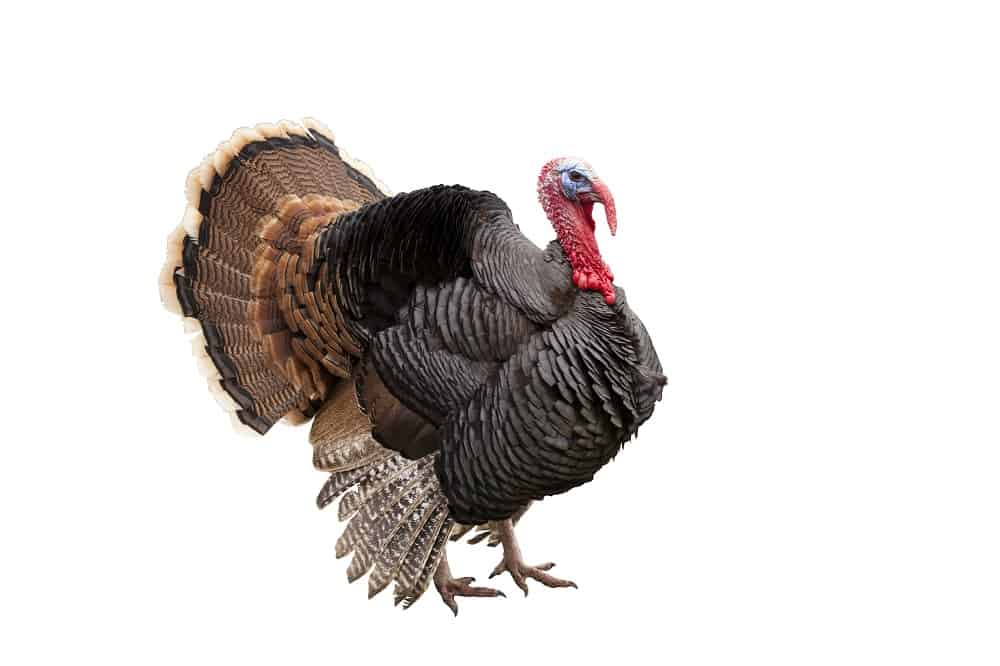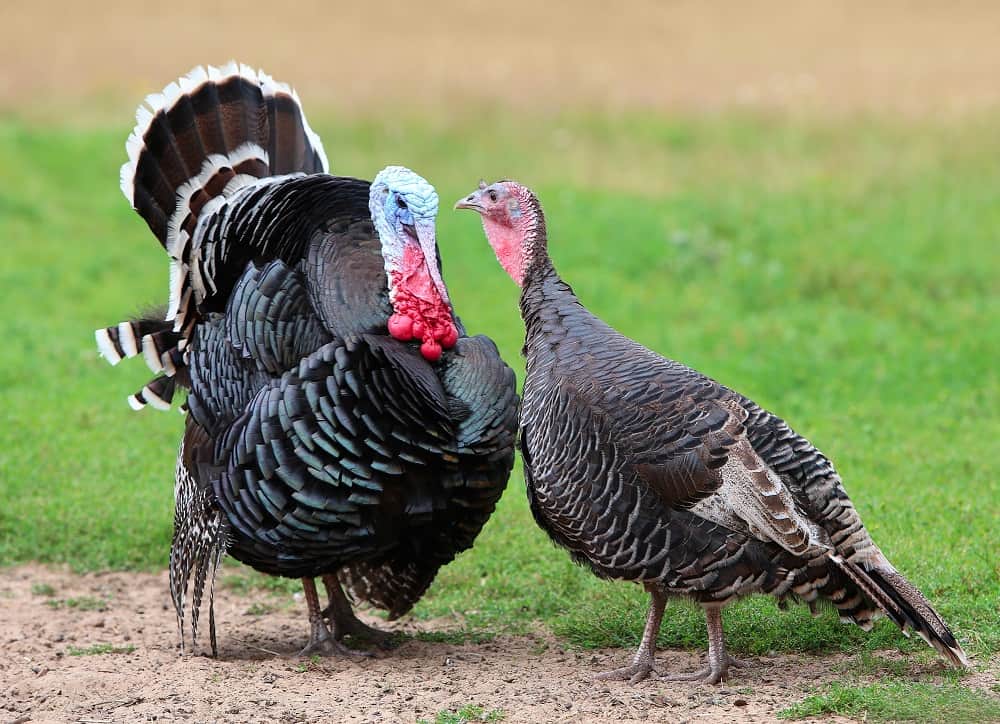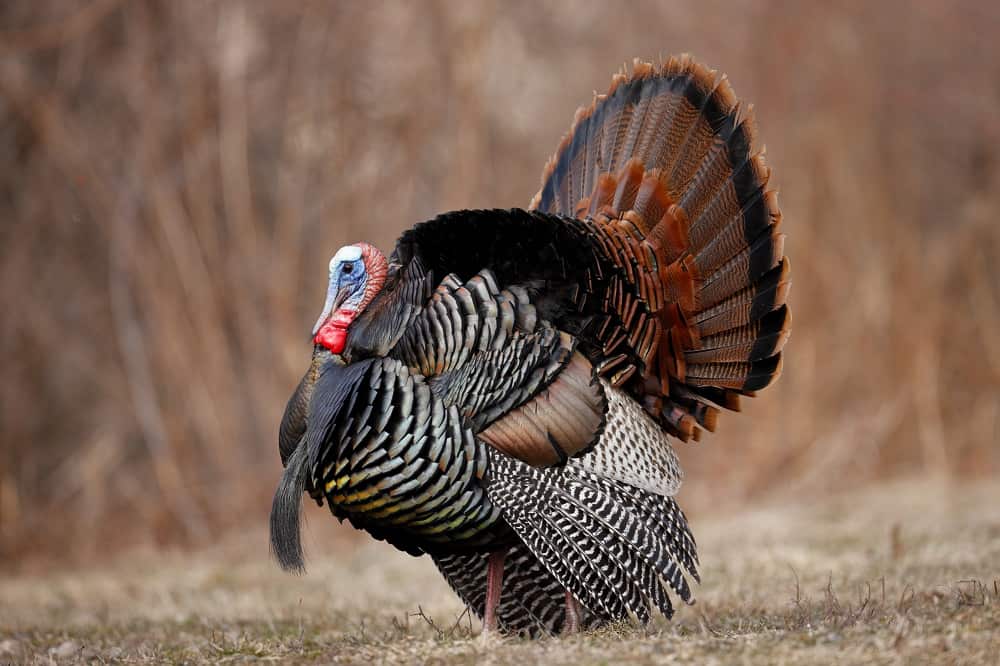
Ready to take the plunge and raise backyard turkeys? Before you do, spend a bit of time researching, including understanding just what they eat.
What do turkeys eat? Turkeys love to eat. Whether it’s cracked corn, freshly fallen crabapples, or even jumping grasshoppers, turkeys are always on the hunt for their next snack.
If you decide to raise turkeys in your backyard, be prepared to have multiple food sources. In addition to an all-encompassing turkey feed, provide places for your turkeys to forage, including under fruit trees or in shrubs.
A more natural habitat will allow turkeys to thrive, making them happier and plumper.
Wild Turkeys (what do they eat)
Wild turkeys are omnivorous and will eat a variety of different foods including plants and animals.
For plants, wild turkeys love acorns, walnuts, and hickory nuts. They will eat these nuts either cracked open or whole as well as plant matter.
Wild Turkeys will also eat corn, wheat, seeds, and grain, as well as berries and crabapples.
As for meat, wild turkeys will eat insects such as spiders and caterpillars as well as snails and small lizards.
Backyard raised or farm-raised Turkeys (what do they eat)

If you have backyard turkeys, you will want to mimic what they eat in the wilderness.
Commercial-grade food feed is recommended as it will have all the nutrients turkeys need to stay healthy.
You can also supplement this feed with corn and grain.
If you have space, you can also allow your turkeys the opportunity to partially forage for themselves.
This is when turkeys have access to a larger area and can naturally feed on insects and vegetation.
Different types of turkey feed
Turkey babies, or poults, need their own special feed. Be sure to use a game starter or chick starter that has extra protein in it.
Once a turkey is eight weeks old, you can switch to a grower feed. Use a turkey feed specially for this, as chicken feed will have less protein in it.
If you are growing turkeys for slaughter, they will be ready after the six-month mark.
How to feed and water turkeys
Turkeys will eat constantly if you let them, so be prepared for constant foraging. Set up multiple food sources where nutrients will be placed.
While turkeys eat, they often scratch their feet. As a result, their feeding grounds will quickly be torn up.
Be prepared for this, so create feeding grounds that are on dry dirt where there won’t be any cause for damage.
For water, provide large water tubs that are low to the ground. This will allow turkeys to easily sip their water. Make sure the water is fresh and clean.
If you have space, it’s a nice idea to plant fruit trees, such as crabapple and cherry trees. These will provide an abundant, natural food source for your turkeys to forage under.
If you have baby turkeys or turkey poults, you will need to keep them safe. Like chicks, poults need a lot of heat.
Keep them inside for the first eight weeks, gradually giving these young birds time in the sun before allowing them to be outside full time.
For turkey poults, don’t leave large water containers out. These tiny poults can easily fall into the water and won’t be able to escape.
Instead, you can use bottle feeders or very shallow water dishes.
Turkey poults should be given special feed that is high in protein for the first eight weeks before being switched to an adult, growing feed.
Advantages of raising backyard turkeys

Most people naturally think about raising backyard chickens, but when it comes to cleanliness, turkeys have them beat.
Turkeys are far cleaner and food and hay won’t be scattered everywhere.
While you might think of turkeys in North America as being simply Thanksgiving and Christmas dinners, in reality, they can be enjoyed year-round. Backyard-raised turkeys taste delicious and are a great, healthy addition to any diet.
Finally, if you want a bit of personality in your backyard, turkeys are the way to go. They are quite social and sometimes even mimic dogs in their friendliness and loyalty.
You will need quite a bit of space for turkeys, however. Not only do they like to roam, they can become quite noisy, especially male turkeys, also known as toms.
The more space you have between your backyard and your neighbor’s the happier everyone will be.
Related Questions
Can turkeys smell you?
Turkeys have very few taste buds (just a few hundred compared to a human’s 10,000). As a result, turkeys have a very weak sense of smell.
Can turkeys hurt you?
Wild turkeys can be quite aggressive, especially if they are protecting their food source or feel intimidated by a larger animal.
When turkeys feel threatened, they can attack you. This can involve the use of their sharp beaks and talons.
Furthermore, turkeys can flap their wings quite quickly, causing a lot of confusion.
It’s best to stay calm around turkeys and not come between them and their food source.
What is the best bait for wild turkeys?
Turkeys love cracked corn, oats, and ryegrass. You can spread these foods out and turkeys will start to forage for them, quickly becoming habitual in their love of food.
How do you attract turkeys to your land?
If you have wild turkeys near your property but want them on your land, create a food trial. Layout corn, oats, or ryegrass and tempt them to where you want them to be.
You should start looking for adult wild turkeys in early spring. Look for large trees and underneath them, you should be able to see droppings and feathers. This is a sign that turkeys are nearby.
Do wild turkeys eat ticks?
Yes, wild turkeys eat deer ticks. However, it is not their main source of food and thus is not an efficient way of controlling the tick population.
Recommended Post: Feeding Domesticated Turkeys, other feeds should never be a substitute.
Conclusion
Turkeys make excellent backyard birds. You can feed your turkey flock an assortment of natural foods including seeds, grains, apples, and even bugs.
And after being exposed to a nutritious diet, your turkeys will end up being quite delicious.

